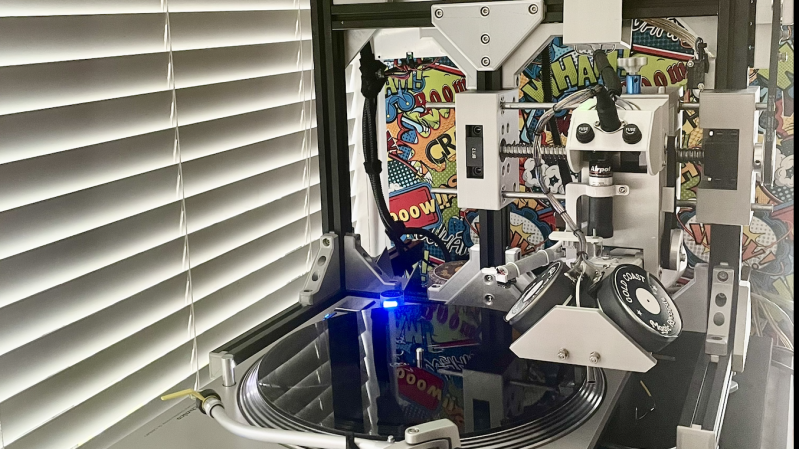Back in the day, one of the few reasons to prefer compact cassette tape to vinyl was the fact you could record it at home in very good fidelity. Sure, if you had the scratch, you could go out and get a small batch of records made from that tape, but the machinery to do it was expensive and not always easy to come by, depending where you lived. That goes double today, but we’re in the middle of a vinyl renaissance! [ronald] wanted to make records, but was unable to find a lathe, so decided to take matters into his own hands, and build his own vinyl record cutting lathe.
![photograph of [ronald's] setup](https://hackaday.com/wp-content/uploads/2025/04/groovy_lathe.png?w=301)
The build log discusses some of the challenges faced–for example, [ronald] started with locally made polycarbonate disks that weren’t quite up to the job, so he has resigned himself to purchasing professional vinyl blanks. The power to the cutting head seems to have kept creeping up with each revision: the final version, pictured here, has two 50 W tweeters driving the needle.
That necessitated a better amplifier, which helped improve frequency response. So it goes; the whole project took [ronald] fourteen months, but we’d have to say it looks like it was worth it. It sounds worth it, too; [ronald] provides audio samples; check one out below. Every garage band in Queensland is going to be beating a path to [ronald’s] door to get their jam sessions cut into “real” records, unless they agree that physical media deserved to die.
Despite the supposedly well-deserved death of physical media, this isn’t the first record cutter we have featured. If you’d rather copy records than cut them, we have that too. There’s also the other kind of vinyl cutter, which might be more your speed.
















I’ve heard to can record on to acetate sheets. The resulting records will only play a few times before they get worn out, but they are cheaper than vinyl blanks and work great if you just need a record for a one off gig, gift, test or something.
There’s a whole subculture of people who collect old Soviet records cut into x-ray film, because there wasn’t a lot of material for cutting bootleg radio recordings.
Bone Music.
I created a spotify playlist with the artists and tracks of bone records i found on ebay.
Getting an artist’s “wax” record was a huge deal back in the day. Usually they would do a small run of a dozen or so just to test it before a real pressing run and yes it definitely wore out super fast. If you knew who to ask or had been around a bit you could find them.
I just got some test pressings, but they’re in vinyl at least. Still kinda fun even with their packaging scratches/blemishes.
Stefan Betke, aka Pole, is a world famous vinyl masterer and artist. Much of his music is comprised of sounds he records of his vinyl production equipment, he coaxes the cold metallic and plastic noises into some quite relaxing dub influenced IDM. Tangential but seemed relevant.
Please stop saying things like physical media deserves to die. The more you say it, the more it will be picked up by others. Some of us don’t have consistent internet to stream music/videos etc., and actually like to own our own copy of media.
Not using physical media doesn’t mean streaming.
I ripped all my CDs to FLAC years ago and plugged a good quality bluetooth receiver into my stereo so I can play music off my phone. I could plug a USB drive into the stereo instead, or get something that connects to my NAS over wifi so my whole collection is available at once.
I still hold and collect CDs because I like them, but I very rarely play them. I keep them where they are safe. My favorites I’ve already burned perfect copies of so I can play those instead.
very nice project and build
the physical media must die, thing is just pointless
and as a gen x person who enjoys music on my phone…that may not exist anywhere as physical media? sd cards?, but also has vinyl that I know exists out there in.10’s of milliins of copys, many of which will still exist and be playable long long after existing digital.stuff, bit rots into oblivion, and keep in mind that ALL perception is analog, so
live and let live eh!,
Something must be in the air…
Dinsync is also working on a vinyl cutter – https://www.instagram.com/p/DIzG_qnIW5f/ https://www.youtube.com/watch?v=bJloBojUlDs
He’ll be showing it off more at superbooth.
Yes indeed it’s exciting times for the vinyl format! Thank you all for your support 🎉